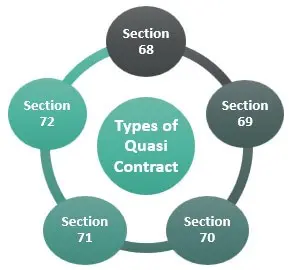Introduction
Most people are familiar with express contracts in contract law, where terms and agreements are clearly stated. However, quasi contracts are an equally important yet less understood aspect of contractual obligations.
Quasi contracts, also known as implied-in-law contracts, are not actual contracts but are legally enforceable obligations imposed by courts to prevent unjust enrichment.
What is a Quasi Contract?
A quasi contract is a legal concept where the law imposes obligations on a party to ensure fairness. Even though there is no formal agreement between the parties. The primary aim of a quasi contract is to prevent one party from being unjustly enriched at the expense of another.
Key Elements of Quasi Contracts
- Unjust Enrichment: The core principle behind quasi contracts is unjust enrichment. This occurs when one party benefits at the expense of another in a manner deemed unjust by the court.
- No Formal Agreement: Unlike traditional contracts, quasi contracts do not arise from any agreement between the parties. Instead, they are imposed by law.
- Legal Remedy: The court can order the benefiting party to compensate the other party to rectify the unjust enrichment.
Situations Where Quasi Contracts Apply
Quasi contracts typically arise in situations where services or goods are provided. And the provider expects to be paid, even though no explicit agreement exists. Here are a few common scenarios:
Goods or Services Delivered by Mistake
If a person receives goods or services by mistake, the court may impose a quasi contract requiring the recipient to pay for the benefits received.
Example: If Company A mistakenly delivers a shipment of goods to Company B, and Company B uses the goods, a court may require Company B to pay Company A for the value of the goods.
Services Rendered Under an Invalid Contract
When services are provided under a contract that turns out to be invalid, the provider may still be entitled to payment.
Example: A contractor who performs work based on a contract that is later found invalid. Can still seek compensation for the services rendered under a quasi contract.
Necessities Supplied
If a person provides necessary services or goods to another who is incapable of contracting (such as a minor or a person with a disability), the provider can seek compensation under a quasi contract.
Example: If a doctor provides emergency medical care to an unconscious person, the doctor can claim payment for the services under a quasi contract.
Legal Basis for Quasi Contracts
Quasi contracts are recognized under the Indian Contract Act, of 1872, specifically under sections 68 to 72, which outline scenarios where the law imposes an obligation to prevent unjust enrichment.

Image Source: wallstreetmojo.com
- Section 68: Obligation of person enjoying the benefit of non-gratuitous act.
- Section 69: Reimbursement of person paying money due by another in payment of which he is interested.
- Section 70: Obligation of person enjoying the benefit of a non-gratuitous act.
- Section 71: Responsibility of finder of goods.
- Section 72: Liability of person to whom money is paid or thing delivered by mistake or under coercion.
Remedies in Quasi Contracts
When a quasi-contract is established, the primary remedy is restitution. Restitution aims to restore the injured party to the position they were in before the unjust enrichment occurred. This typically involves compensating the party for the value of the goods or services provided.
Examples Illustrating Quasi Contracts
- Finder of Goods: If a person finds and takes care of lost property, they can claim reimbursement for any expenses incurred in caring for the property until the owner is found.Example: If John finds a lost dog and incurs expenses for its care, he can claim these expenses from the dog’s owner once they are found.
- Payment by Mistake: If someone mistakenly pays another person’s debt, they can seek reimbursement from the person who benefited from the payment.Example: If Alice accidentally pays Bob’s utility bill, she can seek repayment from Bob for the amount paid.
Conclusion
Quasi-contracts play a crucial role in ensuring fairness and preventing unjust enrichment in situations where no formal contract exists. By understanding the principles and applications of quasi-contracts, individuals and businesses can better navigate scenarios where legal obligations arise without explicit agreements.
Also Read: Doctrine of Frustration
Reference: topper.com